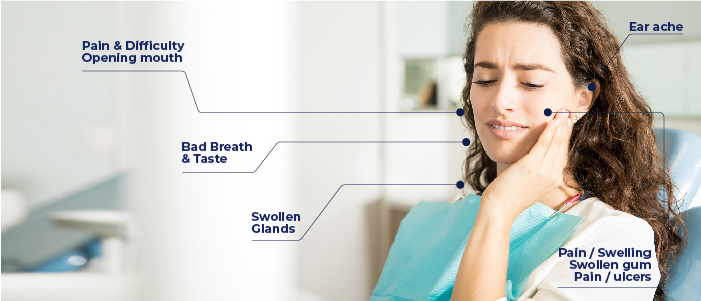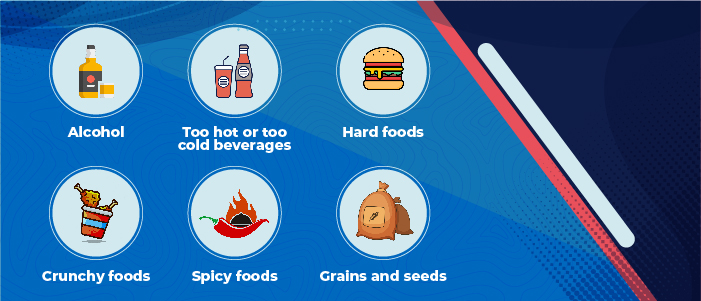Testing a mattress for free before trying it out is a fantastic opportunity. Here’s how you can try out online mattresses in person before buying.
Blog > How To Sleep After Wisdom Teeth Removal 2024 [Complete Guide]
Blog > How To Sleep After Wisdom Teeth Removal 2024 [Complete Guide]
Wisdom tooth removal is one of the most common surgeries in the United States. This outpatient procedure is quick and does not often have complications, but it is, unfortunately, not painless. Recovery is difficult due to pain, limited food, swelling, and possibly prolonged bleeding. If you are unable to get a good night’s sleep, recovery can be even worse and much slower. Here, we will provide you with some tips on how to sleep after wisdom teeth removal.

Wisdom tooth removal surgery, or wisdom teeth extraction, involves removing the in the back of the mouth. These molars, often known as "wisdom teeth," usually emerge between the ages of 17 and 25. While not everyone has them, most people have between one and four. Although recovery from wisdom tooth extraction might last up to six weeks, most patients are able to resume their regular activities in a day or two.

The majority of people have at least one impacted wisdom tooth, which means it does not have enough space to develop normally. You can prevent your wisdom teeth from harming the adjacent teeth and bones by having them removed, whether due to an impaction or because they have the potential to cause problems.
The surgery is an outpatient procedure, meaning you won’t have to stay overnight in a hospital, and is either performed by an oral surgeon or dentist. Patients are under anesthesia during the procedure. During the surgery, the gums are cut and the teeth are removed either in pieces or as a whole.
A dentist will recommend that you have your wisdom teeth extracted if an examination and X-rays reveal that your wisdom teeth are impacted or that they have the potential to cause dental issues in the future.
Having wisdom teeth can lead to a variety of problems, including the following:
Your dentist will monitor the development of your wisdom teeth by looking at X-rays taken of your mouth during routine appointments. Even if you aren't experiencing any symptoms right now, your doctor may still recommend having your wisdom teeth out in order to stave off potential complications in the future. When present, wisdom teeth are situated in an area of the mouth that is difficult to clean, which can make it challenging to practice good dental hygiene and cause potential health problems.
For the procedure, an oral surgeon may be recommended to you as the best option. Before the operation, the surgeon will schedule a session with you, during which they will examine your dental records and take further X-rays in order to ascertain the scope of the work that has to be done.

For the procedure, you should dress in comfortable clothing that is loose fitting. Wear a blouse that allows the sleeves to be rolled up easily or one that has short sleeves if you are going to be receiving intravenous anesthetic. There will be no need for you to change into anything before the operation.
Be sure to start by taking any prescribed medications that have been given to you by your doctor. This is important for two reasons: first, it will help fend off any infection, and second, if you are in pain, it will make it easier for you to go asleep at night. Both of these benefits are important.
Even when you are sleeping, you will need to keep your head elevated at a 45-degree angle for at least 36 hours after having your wisdom teeth out in order to ensure proper healing. Because blood vessel tone (the tightness of your blood vessels) and blood volume tend to increase near the cut when you are lying flat, elevating your body will help you recover from the injury more quickly. This can cause the wound to become painful, which can then lead to increased pressure and bleeding, which both slows down the healing process. Keeping your head tilted back will also assist minimize any swelling and inflammation that may be present.
The following piece of advice might seem like common sense, but in order to avoid accidentally suffocating on the gauze while you sleep, you should take it out of your mouth before going to bed. It is customary to wait approximately thirty minutes following surgery before removing the gauze, but your dentist should let you know when it is safe to do so.
In general, you should make sure that you arrange time to relax after your operation, and this time should not be limited to the period when you are supposed to be sleeping at night. If you put too much pressure on yourself after having your wisdom teeth extracted, the healing process will be more uncomfortable, which will result in less peaceful sleep. This will also slow down healing time. Therefore, call in sick for a few days, stay in as little as possible, and sleep whenever you get the chance.
Ice is a great way to help reduce pain and swelling, which are a given after a wisdom tooth extraction. It is recommended that you put an ice pack wrapped in a towel to your jaw for 10 to 20 minute intervals.
A wisdom teeth extraction may result in certain typical side effects. Here are the typical symptoms and how you can help manage them.
To aid you manage your pain, you might get a prescription from your doctor. Take your medication to help reduce pain, which will help you sleep better. Make sure to tell your doctor about any other medications you take, including supplements, to avoid complications or drug interactions. Also, tell your doctor if you have any allergies to medications.
This is a typical symptom, and patients should expect to notice some bleeding from the incision site. To help stop the bleeding, avoid spitting too much and apply gauze to the area where the tooth was extracted. If you are bleeding excessively or can’t stop the bleeding, call your doctor or visit a local emergency room.
Bruising and swelling can be rapidly alleviated by using an ice pack on the affected area. This will help reduce any swelling by constricting blood vessels. When compared to swelling, which typically lasts longer, bruising often disappears after a few more days.
Nausea is a common side effect experienced by patients after surgery. This is due to anesthesia, side effects of pain medications, and not eating as much as you normally would. If you feel nauseous, try drinking some ginger ale and giving yourself some time to relax so that your body can get back to normal.

It is extremely important that you wait at least twenty-four hours following surgery before brushing your teeth, using mouthwash, or rinsing your mouth with water. When you begin brushing your teeth again, make sure to take extra precautions and rinse your mouth with a solution of warm salt water every two hours.
After surgery, you should refrain from smoking for at least 72 hours, and ideally for a longer period of time. Patients should refrain from chewing tobacco for a minimum of one week in order to avoid interfering with the natural healing process that occurs within the body.
If you have any of the following symptoms, it is crucial that you get medical attention as soon as possible:
After having your wisdom teeth removed, it is not uncommon to experience insomnia. Wisdom tooth removal itself does not directly cause insomnia. The pain, swelling, bleeding, and general discomfort of the procedure is what causes insomnia after wisdom tooth removal. Taking any pain medication your doctor prescribed or using an OTC pain reliever can help you get some sleep. If you are experiencing extreme pain, prolonged bleeding, excessive swelling, or severe insomnia, contact your doctor.
The average recovery time following wisdom tooth removal is three to four days. If your teeth grew in at an unusual angle or were impacted, the healing process may take up to a week.
Due to the fact that the surgical wound won't be completely healed for several months, you still run the risk of getting an infection week following surgery. Take care of yourself, and remain vigilant in case you experience any symptoms.
You will be able to return to your normal activities the day after surgery; however, you should steer clear of anything that has the potential to disrupt your stitches or the blood clot that is covering your wound.
This includes, but is not limited to, the following examples:
By the third day following surgery, your symptoms ought to be significantly better. Following surgery, there should be no more pain, and the bleeding should stop within a week's time. Following the removal of wisdom teeth, it is common for the patient to experience some swelling, discomfort, and bleeding. Call your dentist as soon as possible if you are suffering significant pain or bleeding after visiting the dentist.
One of the biggest questions patients have after wisdom teeth removal is about the types of food they can eat and what they can drink. There are some food and beverages that can both help make you feel better after surgery and can speed up the recovery process. Here are some foods and beverages that are recommended after wisdom teeth extraction.

Keeping yourself well hydrated is one of the most important things you can do for your health. It will assist your body in remaining healthy and will speed up the healing process.
Ginger is known for easing nausea and settling an upset stomach, which is common after surgery. If you aren’t into soda or carbonated beverages, try ginger tea.
These sports drinks are loaded with vitamins that can help your body recharge and strengthen itself so that it can better defend itself against infections.
Smoothies offer post-operative dental patients a tasty and convenient snack. Add a meal replacement packet, protein powder, and a milk base to smoothies for extra nutritional value. To keep things healthy, add fresh, seedless fruits like bananas to your smoothie. Small seeds, such those in fruits like raspberries, might get caught in the surgery incisions and cause additional pain and a longer recovery time. Do not drink with a straw. This can cause a dry sock which can interfere with healing.
Yogurt is the perfect food for patients healing from wisdom tooth surgery because of its consistency. Steer clear of yogurts that have granola or any other chewable ingredients. If you have trouble swallowing pills, you can add them to yogurt to help make taking them easier.
Applesauce is a fantastic soft food to eat after having your wisdom teeth removed because of its smooth and pureed consistency. Applesauce is an excellent source of vitamin C as well as dietary fiber, both of which are important components of a well-balanced diet. This nutrient-dense food requires relatively little movement of the jaw, so it's great for those who are trying to rehabilitate or avoid getting tired jaw muscles.
Eggs are a soft food full of vital nutrients like protein and vitamin D, both of which will aid in recovery and healing. When eating eggs after wisdom tooth removal, avoid adding too many spices that can get caught in incisions.
Soups made with broth are another creation option for those who have recently had their wisdom teeth removed. Although you probably won't feel up to eating soups for at least a couple of days after the surgery, they are a great source of protein and a healthy alternative to sugar-filled foods, like ice cream and certain smoothies, that are often recommended in the days following the removal of wisdom teeth. After having your wisdom teeth removed, you should consume warm soup (not hot soup!) in order to keep up a balanced diet and acquire lots of nutrients. You should avoid soups that have huge chunks of meat or vegetables; however, it's fine to have some little fragments of meat or vegetables floating around in the broth. After surgery, some of the best things to eat are chicken noodle soup, tomato soup, beef broth, cream of celery soup, or vegetable broth.
After having your wisdom teeth removed, you deserve a special treat! What's a better treat than ice cream? Be sure to limit your diet to soft-serve desserts, particularly in the first few days after surgery, as this type of food requires less effort to chew and swallow. The cold temperature of ice cream reduces inflammation in the tissue and helps the body heal itself more quickly. Avoiding cones, sprinkles, and other toppings can overwork your jaw, which can lead to inflammation or infection at the extraction site, and small particles can become trapped there. It is best to hold off on eating flavors like Rocky Road and Mint Chocolate Chip for at least five days after surgery, when the incision site should be fully healed and able to withstand food.
It is common for patients to have "taste bud boredom" after undergoing surgery; however, this can be avoided by eating pudding and Jell-O. This is an easy-to-eat meal, which comes in a range of flavors. For a quicker and less difficult preparation process, make use of the instant packets or pre-made cups. The long shelf life that Jell-O and pudding mixes have in the refrigerator is another important advantage that they offer. These packets can be mixed up before your wisdom teeth surgery and stored in the refrigerator for more than a week if you do not have a caretaker.
Tart cherry juice isn’t a classic post wisdom tooth removal surgery drink, but if you are having trouble sleeping, tart cherry juice can help. In a 2018 study, it was discovered that those who drank two cups of tart cherry juice daily slept longer and more effectively than those who did not. Tart cherry juice isn’t as tasty as other popular juices and many do not like the taste. You can add water or honey to sweeten it up, or buy tart cherry supplements.
Like tart cherry juice, chamomile tea is another drink to add to your post-surgery routine to help you sleep. Chamomile has been shown to be a successful sleep aid and to relieve post-wisdom tooth extraction symptoms like inflammation and upset stomach.
While your foods are limited after getting your wisdom teeth removed, there are some foods and drinks that you should avoid completely until you are completely healed and no longer taking pain medication.

Avoid drinking alcohol at least 48 hours after your surgery. It is best to completely abstain from alcohol until you are completely healed. Alcohol can interact with pain medications and anesthesia which can have deadly consequences.
Following surgery, your mouth will be particularly sensitive, so you should limit yourself to lukewarm beverages and refrain from drinking hot beverages like coffee or tea.
Hard foods should be avoided after having teeth extracted since they might cause the stitches to come undone and put strain on the extraction site. This puts the patient at risk of infection as well as further problems. Additionally, avoid chewy foods as well.
Foods that are easy to crumble, such as potato chips, have a far higher risk of becoming lodged in the wound, which increases the risk of infection.
Foods that are too spicy can cause irritation. Avoid eating anything too hot and spicy until your wounds are healed.
Grains and seeds can also get lodged and stuck in wounds, which also leads to infection.
Sleeping after getting your wisdom teeth removed can be difficult, but it doesn’t have to be. Besides the tips above, here are a few more things you can do to sleep better after your wisdom teeth extraction.

Elevating your head with pillows will help reduce swelling. When swelling is reduced, it will help the wounds heal faster. Elevating your head will also prevent blood clots.
When going to sleep, make sure that your room is comfortable so you get quality sleep. Keep your room dark and cool, use white noise, and use comfortable sheets and pillows.
Side sleeping allows you to keep your head propped up. Back and stomach sleeping does not allow for this.
If you are having trouble getting comfortable, it might be time for a new mattress or for a modification. If adding a mattress topper or additional support pillows doesn’t help you get more comfortable, it might be time for a new mattress.
The best pillow type is after wisdom teeth removal is a pile of pillows that elevates your head. This helps to reduce swelling and prevents blood clots. A firm pillow will help support your head and keep you elevated. It is recommended to use an old pillowcase in case of any bleeding.
You can eat soft foods after wisdom teeth removal. Good foods to eat after wisdom teeth removal include smoothies, meal replacement shakes, pudding, Jell-O, applesauce, and lukewarm soups and broths.
You should not sleep with gauze after wisdom teeth removal. Sleeping with gauze after wisdom tooth removal is a choking hazard.
You should not sleep with an ice pack after a wisdom tooth extraction. Sleeping with ice on your face could potentially lead to frostbite. It is best to only use ice when awake.
A removed wisdom tooth can not cause sleep apnea. There is no evidence that tooth extraction of any kind can cause sleep apnea.
A removed wisdom tooth could possibly cause snoring. The physiology of your mouth and your airway can be affected by missing teeth, which can lead to snoring whether you lost a tooth due to an accident or had several surgically removed.

Getting your wisdom teeth removed will no doubt be painful. If you follow your doctor’s advice, take your medication, and follow the tips mentioned in above, you can greatly diminish your pain and increase your healing time. If you are experiencing any complications after any procedure, see your doctor.
Please leave a comment below and tell us about your wisdom teeth removal experience. We would really appreciate hearing from you.

 Showrooms
Showrooms
About The Author
Dustin Morgan
Sleep Expert & Store Manager
Dustin Morgan is the Chief Mattress Analyst and Sleep Technology Expert at SleePare. He combines his computer science background with his passion for sleep innovation. With personal experience testing over 200 mattresses, Dustin offers unmatched insights into finding the perfect sleep solution for various needs. His work focuses on delivering honest and detailed comparisons and advice to help individuals achieve their best sleep. When he is not exploring the latest sleep technology, Dustin enjoys spending time in the great outdoors and gaming in his Virginia home.